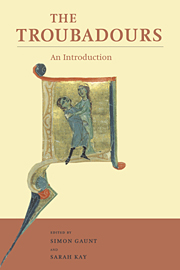Book contents
- Frontmatter
- Contents
- List of contributors
- Preface
- Map of Occitania and neighbouring Catalonia
- Introduction
- 1 Courtly culture in medieval Occitania
- 2 Fin'amor and the development of the courtly canso
- 3 Moral and satirical poetry
- 4 The early troubadours: Guilhem IX to Bernart de Ventadorn
- 5 The classical period: from Raimbaut d'Aurenga to Arnaut Daniel
- 6 The later troubadours
- 7 The trobairitz
- 8 Italian and Catalan troubadours
- 9 Music and versification
- 10 Rhetoric and hermeneutics
- 11 Intertextuality and dialogism in the troubadours
- 12 The troubadours at play: irony, parody and burlesque
- 13 Desire and subjectivity
- 14 Orality and writing: the text of the troubadour poem
- 15 The chansonniers as books
- 16 Troubadour lyric and Old French narrative
- Appendix 1 Major troubadours
- Appendix 2 Occitan terms
- Appendix 3 Research tools and reference works
- Appendix 4 The chansonniers
- Bibliography
- Index
Appendix 1 - Major troubadours
Published online by Cambridge University Press: 05 June 2012
- Frontmatter
- Contents
- List of contributors
- Preface
- Map of Occitania and neighbouring Catalonia
- Introduction
- 1 Courtly culture in medieval Occitania
- 2 Fin'amor and the development of the courtly canso
- 3 Moral and satirical poetry
- 4 The early troubadours: Guilhem IX to Bernart de Ventadorn
- 5 The classical period: from Raimbaut d'Aurenga to Arnaut Daniel
- 6 The later troubadours
- 7 The trobairitz
- 8 Italian and Catalan troubadours
- 9 Music and versification
- 10 Rhetoric and hermeneutics
- 11 Intertextuality and dialogism in the troubadours
- 12 The troubadours at play: irony, parody and burlesque
- 13 Desire and subjectivity
- 14 Orality and writing: the text of the troubadour poem
- 15 The chansonniers as books
- 16 Troubadour lyric and Old French narrative
- Appendix 1 Major troubadours
- Appendix 2 Occitan terms
- Appendix 3 Research tools and reference works
- Appendix 4 The chansonniers
- Bibliography
- Index
Summary
Aimeric de Belenoi (… 1216–43 …) PC 9: Poésies du troubadour Aimeric de Belenoi, ed. Maria Dumitrescu, SATF (Paris, 1935). A native of the Bordelais, he was a cleric turned joglar, and composed some fifteen (perhaps as many as twenty-two) surviving songs (one with music) dismissed by Dumitrescu as ‘banal’ but well received by medieval audiences, especially in Italy, and offering interesting combinations of religious, moral and amorous themes.
Aimeric de Peguilhan (… 1190–1221 …) PC 10: William P. Shepard and Frank M. Chambers, The Poems of Aimeric de Peguilhan (Evanston, IL, 1950). Born in Toulouse of bourgeois family, but made most of his career in the Iberian peninsula and then Italy, and author of c. fifty poems (five with surviving music), mainly limpid cansos, plus a number of occasional pieces and exchanges with other troubadours (including Albertet and Sordello).
Albertet (… 1194–1221 …) PC 16: Jean Boutière, ‘Les Poésies du troubadour Albertet’, Studi Medievali N.S., 10 (1937), 1–129. Troubadour from Gap (Hautes-Alpes) who began his career as a joglar, with twenty-one (perhaps twenty-five) surviving poems (three with music), mostly conventional love songs, one descort, and a number of debates, including one with Aimeric de Peguilhan.
Alegret (… 1145 …) PC 17: Alfred Jeanroy, Jongleurs et troubadours gascons des XIIeet XIIIesiècles, CFMA (Paris, 1923), pp. 4–11. Referred to by Marcabru, Raimbaut d'Aurenga, and possibly Bernart de Ventadorn, but has only two songs surviving.
[…]
- Type
- Chapter
- Information
- The TroubadoursAn Introduction, pp. 279 - 291Publisher: Cambridge University PressPrint publication year: 1999



